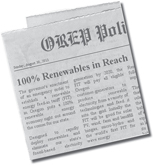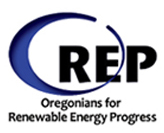Indiana Legislator Introduces Feed-in Tariff Bill
First Comprehensive Proposal of 2010 in US
Adapts Rates from Ontario for a "Made In Indiana" Policy
January 8, 2010
By Paul Gipe
Representative Matt Pierce (D-61st, Bloomington) introduced AB 1190 into the Indiana General Assembly January 7, 2010. The bill is the first comprehensive proposal for a system of feed-in tariffs in the current legislative sessions that have begun in states across the US.
The bill to create a system of what Representative Pierce calls Advanced Renewable Energy Contracts was referred to the Assembly Committee on Commerce, Energy, Technology and Utilities. Representative Pierce is vice chair of the committee.
Representative Pierce had introduced a previous bill on feed-in tariffs in the 2009 session. AB 1190 has been extensively rewritten and has incorporated the feed-in tariffs, or renewable energy rates as they will be called in Indiana, recently introduced in the Canadian province of Ontario.
The proposed rates in AB 1190 have been adapted to the Indiana context by incorporating two tracks: one track with US federal subsidies, one track without. Unlike Ontario, where there are no federal subsidies for renewable energy, some Indiana projects could qualify for US federal subsidies. However, not all potential renewable energy generators in Indiana may be able to use the federal subsidies. For those who may not be able to use the federal subsidies, Representative Pierce has proposed the second track where the feed-in rates are proportionally higher.
Republican Governor Mitch Daniels and the legislature have liked to characterize Indiana as a potential renewable energy hub of the Midwest.
AB 1190 tries to go Ontario one better as competition for renewable energy heats up in North America's heartland. Representative Pierce has proposed a sophisticated system of rates for wind energy that is based on the intensity of the wind resource. Both Germany and France successfully use a similar policy and the concept has been raised frequently in Ontario. However, the Canadian province has yet to adopt such a program.
Differentiating the rates for wind energy based on the wind resource is used by Germany and France both to spread development opportunity to more farmers and rural landowners than one, single rate for wind energy, but also to avoid the concentration of wind turbines in only the windiest regions. Such a proposal in Indiana would give farmers in central Indiana as much opportunity to develop their wind resource as farmers in northern Indiana where it is windier.
And in another departure from Ontario, Representative Pierce has proposed specific tariffs for small wind turbines like those that would be used by individual households. While AB 1190's proposed rates for small wind turbines are less than those that will likely go into effect this April in Great Britain, they are the first of their kind in North America.
In other provisions, the bill requires the Indiana Utility Regulatory Commission (IURC) to review the renewable energy rates paid to new generators beginning in 2012. AB 1190 directs the IURC's review to ensure the rates are sufficient for the rapid development of renewable energy without resulting in excessive profits for generators or excessive costs to ratepayers.
The bill establishes an equalization program to spread the costs of the policy across all ratepayers so that no one utility or its ratepayers absorb more than their fair share of the costs of the program.
AB 1190 creates a statewide registry of generators and requires the IURC to issue annual reports on the robustness of the program in meeting the bill's objective of encouraging the rapid and sustainable development of renewable energy in Indiana.
Before it becomes law, the bill must pass the assembly, controlled by Democrats, and the Senate, controlled by Republicans, and be signed by Republican Governor Daniels.
Summary of AB 1190's renewable energy "rates".
Project size cap: None, 10 MW for solar PV only
Contract terms: 20 years, 40 years for hydro
Technologies: most, excluding biomass from forestry, excluding coal-bed methane
Inflation indexing: 60%
Wind without and with tax credits:
Small <50 m2 (8 m dia): $0.350,$0.245
Small <500 m2 (25 m dia): $0.250,$0.175
Offshore: $0.180,$0.126
Onshore low wind: $0.140,$0.098
Onshore high wind: $0.104,$0.073
Solar PV without and with tax credits:
Any Type <10 kW: $0.650,$0.455
Rooftop >10 kW<250 kW: $0.600,$0.420
Rooftop >250 kW<500 kW: $0.550,$0.385
Rooftop >500 kW: $0.500$0.350,
Groundmounted <10 MW: $0.400,$0.280
Interestingly, Indianapolis Power & Light (IP&L) has proposed a pilot feed-in tariff program to the IURC. The IURC has yet to rule on IP&L's proposal, yet IP&L's proposed wind enegy tariff is quite similar to that in Representative Pierce's AB 1190.
At a site with an average yield of 1,200 kWh/m²/yr, the average or equivalent 20-year tariff for onshore wind energy in AB 1190 is $0.104/kWh without tax credits and $0.073/kWh with federal tax credits. The latter "rate" is nearly identical with that proposed by to the IURC for wind turbines larger than 1 MW by IP&L of $0.075/kWh.
AB 1190 Status <http://www.in.gov/apps/lsa/session/billwatch/billinfo?year=
2010&request=getBill&docno=1190>
AB 1190 <http://www.in.gov/legislative/bills/2010/IN/IN1190.1.html>
AB 1190 Fiscal Impact <http://www.in.gov/legislative/bills/2010/PDF/FISCAL/HB1190.001.pdf>
-End-
This feed-in tariff news update is partially supported by the Jan David Blittersdorf Foundation in cooperation with the Institute for Local Self Reliance. The views expressed are those of Paul Gipe and are not necessarily those of the sponsors.
Paul Gipe


